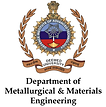Dr. K Suresh Chary, DRDO Scientist
Thesis title: Lead-free Piezoelectric Nanofibers based Nanogenerator for Energy Harvesting and Sensor
Application

Thesis Abstract:
In recent times so much development has taken place in modern electronic systems. As
technology grows, there is an increasing need of portable electronic devices in the field of
defence as well as different daily life activities. However use of batteries as power source for
these portable electronics is limited by it's service life. Hence, there is a demand for
portable, sustained and continuously self-operable energy generators. The Piezoelectric
Nanogenerator is one of the suitable technologies to harvest ambient mechanical energy
from the surroundings and convert it into electricity, ready to supply for portable electronic
devices. However, there are many technical barriers in fabrication and preparation of desired
quality of nanogenerators on an industrial scale. The present work is designed to develop
lead-free ceramic nanofibers based piezoelectric nanogenerator for energy harvesting and
sensor applications.
In this work, it was attempted to produce and characterize different lead-free ceramic
nanofibers with large aspect ratio such as Ba0.85Ca0.15Zr0.1Ti0.9O3 (BCZT) and 0.2 Y2O3-
Ba(Sn0.04Ti0.96)O3 (Y2O3-BST) nanofibers by sol-gel followed by electrospinning. Studies on
structural and morphology of ceramic nanofibers (BCZT, Y2O3-BST) were carried out, to
determine the crystal structure and microstructure of sintered fibers. It was revealed that
there is an enhancement (20-30 °C) of Curie temperature of nano-fibers compared to that of
bulk ceramics for given composition. Present research work also deals with design and
fabrication of ceramic nanofibers based flexible nanogenerators using cost-effective and
scalable process. The developed BCZT nanofibers based nanogenerator exhibited an output
voltage of 2.68 V with maximum power of 2.95 μW for energy harvesting application. BSTY2O3
nanofiber based nanogenerator exhibited significantly higher output voltage of 25 V
with maximum power of 12 μW. Further, nanogenerators were explored for possible
applications as energy harvester and self-powered frequency sensor.
xiii The current work demonstrates the synthesis of one-dimensional (1D) antimony doped
potassium sodium niobate (KNNSb) nanorods (NRs) by hydrothermal process. A new
approach has been adopted to prepare KNNSb NRs/PVDF-HFP composite nanofibers used
for fabricating nanogenerator with more flexibility and ease of handling. Crystal structure
and morphology analysis of KNNSb NRs and composite nano-fibers were carried out using
various analytical techniques. The impact of the KNNSb nanostructures on the dielectric
properties of KNNSb NRs/ PVDF-HFP composite nanofibers was investigated. In addition,
the feasibility study of KNNSb/PVDF-HFP composite nanofiber-based nanogenerator as a
pressure sensor for thermal management of heat-pipe was also carried out.
Further, fabrication of surface modified BCZT nanofibers/ PVDF-HFP based composite film
has been carried out for similar objectives. Surface modification of nanofibers with
dopamine hydrochloride has been performed to enhance the dielectric properties with
reduced dielectric losses for resultant nanocomposite. The developed nanofibers and
nanocomposite films were analyzed by XRD and FE-SEM to investigate crystal structure
and morphology respectively. Dielectric studies were carried out in a wide range of
frequencies and temperature to know the dielectric behavior of the nanocomposite. Finally,
this work also deals with fabrication and performance evaluation of nanocomposite film
based flexible nanogenerator (NG).
